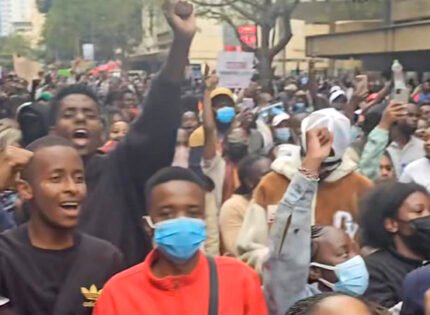The Internet was on fire as a result of a statement made by Women’s rights activist and wife of former British Prime Minister, Cherie Blair.
“Most African ladies’ first sexual experience is rape,” she is quoted as saying before a group of 100 students at a high school in London, UK.
The reaction of Africans all around the world was one of outrage. Although rape is a serious problem many felt that the comment was irresponsible.
Observers such as Dr. Tlaleng Mofokeng, a doctor and a sexual reproductive rights advocate in South Africa, say that a forced first sexual experience is not unique to Africa.
UNICEF estimates that about 120 million girls worldwide under the age of 20 have experienced forced sexual intercourse or other forced sexual acts at some point in their lives. That’s roughly 1 in 10 girls.
While some people say that Blair was highlighting a serious problem, many women called her out for perpetuating racist stereotypes: that African men are violent and African women are weak and unable to give consent. And some critics say as a powerful white woman it was not in her place to talk about African issues.
The leadership lecture, as the event was called, took place on 20 March. In an email, the school said: “We are delighted that this talk has been very popular.”
The outrage is as a result of the single story narrative, the fact that this is a problem for the world at large, should be told as not just another exaggerated statistic for Africa.
Preliminary reports coming out of Africa regarding the investigation of the Ethiopian Airlines Boeing Co. 737 jet seem to be placing blame on operators of the airline.
As of April 3 reports are speculating that the sensors were triggered by external factors, which in turn activated the Maneuvering Characteristics Augmentation System (MCAS) anti stall system.
The MCAS was designed to help prevent an aircraft from stalling or losing lift by issuing commands to push the plane’s nose lower. But it is suspected that it fired up in response to faulty airflow data from a single sensor designed to measure the ‘angle of attack.’
Unfortunately, given the history of reports on African air crashes, the narrative that is pushed is that it is the fault of the carrier. Most of the times it is alleged that the carriers do not maintain their planes, or that they have old planes or poorly trained pilots, and often a combination of all three.
However, the Boeing 737 MAX is a new plane and Ethiopian Airlines have a safety record spanning 70 years. Furthermore, another Boeing 737 MAX previously crashed in Indonesia killing all 189 passengers.
The 737 Max model has been grounded worldwide, putting billions of dollars of orders in jeopardy. Meanwhile, European rival Airbus is filling its boots, securing a $35 billion jet deal from China.
The report on the Ethiopian crash will be officially released on Thursday, April 4. It’s hoped that more light will be shed as to why a piece of cockpit software came back to life after pilots initially switched it off as they tried to save the doomed jet.
In Kinshasa, there’s a new custo![]() mer service manager, Fred. The unique aspect about him is that he is an artificial intelligence robot.
mer service manager, Fred. The unique aspect about him is that he is an artificial intelligence robot.
The first of its kind, he will be offering the services of a mobile phone company to users. The mobile phone company that owns the robot aims to reduce the number of agents currently providing the services of answering subscribers’ questions.
The robot was conceptualized in DR Congo, but its operating system was created and assembled in Russia and has been drawing a lot of attention as it tours public places across the capital of the Democratic Republic of Congo.















